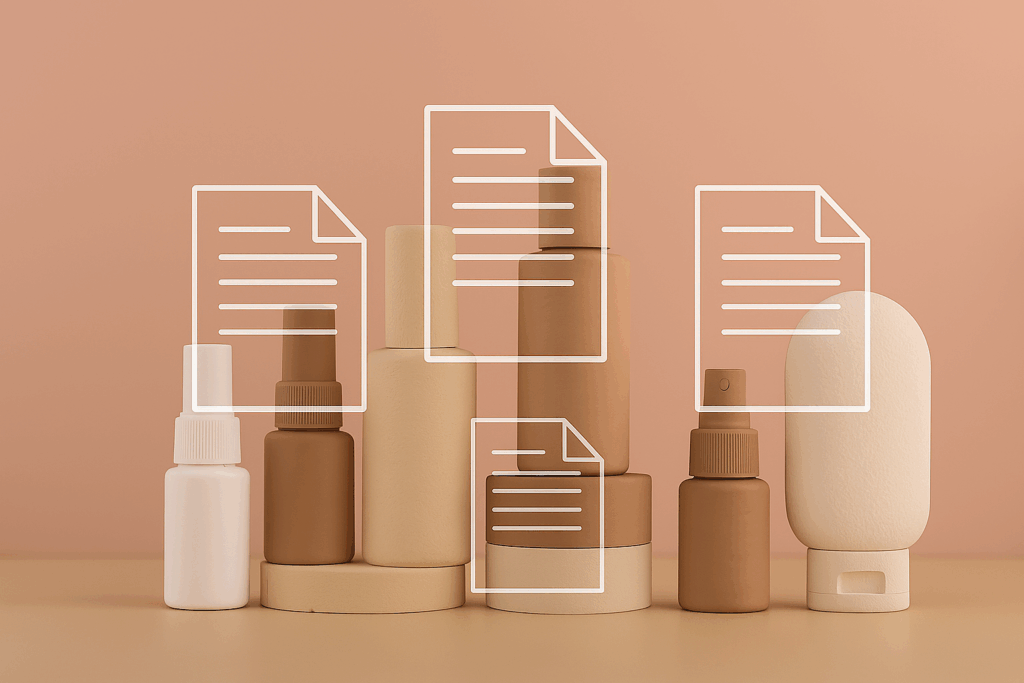Key Terms for Small-Batch Cosmetic Production
A Practical Guide for New Beauty Brands
Are you new to cosmetic production?
For first-time brand planners or aspiring entrepreneurs, one of the biggest initial challenges is understanding the industry-specific terms used in the manufacturing process.
In this post, FactoSquare has compiled the essential terms you need to know in cosmetic production, based on the most frequently asked questions we’ve received while supporting countless small-batch projects.

1. OEM (Original Equipment Manufacturing)
OEM refers to outsourcing only the manufacturing of a product, after the brand has fully completed planning and formula development.
It’s a common choice for brands with in-house R&D capabilities or teams with their own labs.
Best suited for:
- Brands with existing R&D resources
- Those looking to secure competitiveness through proprietary formulas
2. ODM (Original Development Manufacturing)
ODM allows you to simply provide an idea or general direction, and the manufacturer takes care of everything from development to production.
Even a basic concept like “I want to create a moisturizing cream” is enough to start.
Best suited for:
- Those with product ideas but no development or manufacturing resources
- New brands wanting to launch quickly
3. Private Label
Private labeling involves rebranding an existing, ready-made product with your own logo and packaging.
It’s ideal for early-stage brand launches due to its fast turnaround and no need for product development. This method is very common in overseas markets.
4. MOQ (Minimum Order Quantity)
MOQ refers to the minimum quantity required for production.
In the cosmetic industry, the typical MOQ is 3,000–5,000 units, but FactoSquare supports small-batch production starting from 1,000 units.
👉 TIP
- Lower MOQs reduce initial risk
- While unit cost decreases with higher volume, total investment rises — balance is key based on your brand’s situation
5. SKU (Stock Keeping Unit)
SKU stands for Stock Keeping Unit, which is a unit for inventory tracking.
Even products with the same formula are considered separate SKUs if their color, scent, or volume differs.
- 30ml Moisturizing Cream → 1 SKU
- Moisturizing Line + Whitening Line → 2 SKUs
- 5 lipstick colors → 5 SKUs
- Grapefruit + Strawberry Hand Cream → 2 SKUs
The more SKUs you have, the more complex production planning, material sourcing, and packaging become.
That’s why it’s crucial to define SKU count clearly at the planning stage.
6. Lead Time
Lead time is the total time from planning a product to sample creation, production, and delivery.
It typically takes about 6–8 weeks, but this can vary depending on sample revisions or material supply.
👉 TIP – Key Points for Managing Lead Time
- If your launch date is fixed, finalize your sample at least 6–8 weeks in advance.
→ Lead time starts after the sample is confirmed. Delays in earlier stages will affect the whole schedule. - Repeated sample revisions delay the schedule.
→ Provide clear plans and feedback to your manufacturer from the beginning. - Packaging materials (e.g., boxes, labels, containers) need separate lead times.
→ These should be prepared in parallel with other steps. Early scheduling is essential.
7. Mold
A mold is a custom-made tool for producing unique containers.
If off-the-shelf packaging doesn’t suit your brand identity, you can create custom containers to better reflect your brand mood.
While mold-making involves higher upfront costs, it’s effective for long-term branding.
8. Rigid Box (Sabbari)
“Sabbari” is a premium rigid box packaging method, often used for gift sets or high-end product lines.
It features a two-piece structure (lid and base) and enhances brand image.
Note:
- More expensive than standard folding boxes
- May have higher MOQs for small-batch runs
- Ideal for marketing campaigns or limited editions
These terms are commonly used throughout the cosmetics production process and directly impact communication accuracy during development and manufacturing.
For new brands, understanding this terminology is essential for effective planning and product success.
FactoSquare supports small-batch production starting from 1,000 units, offering optimized manufacturing partnerships through OEM, ODM, and private label models.



